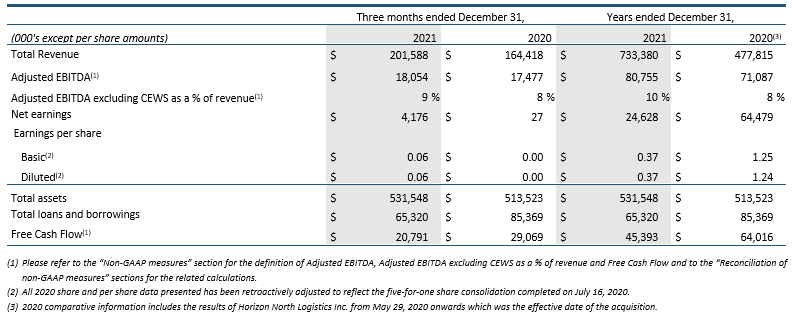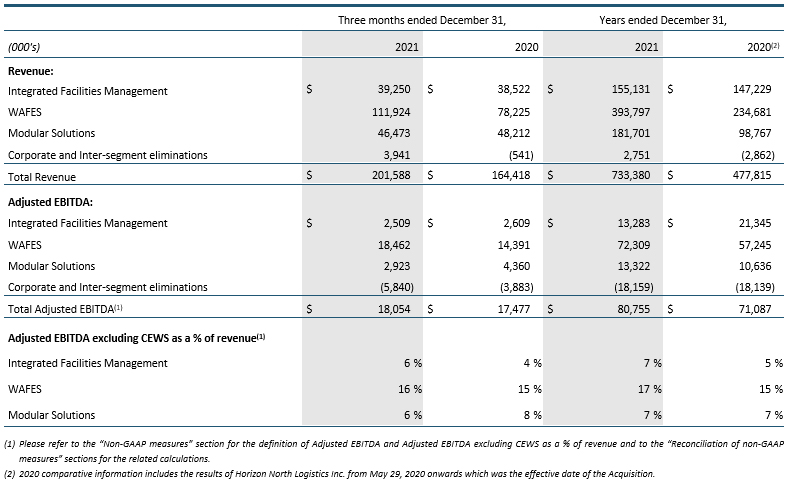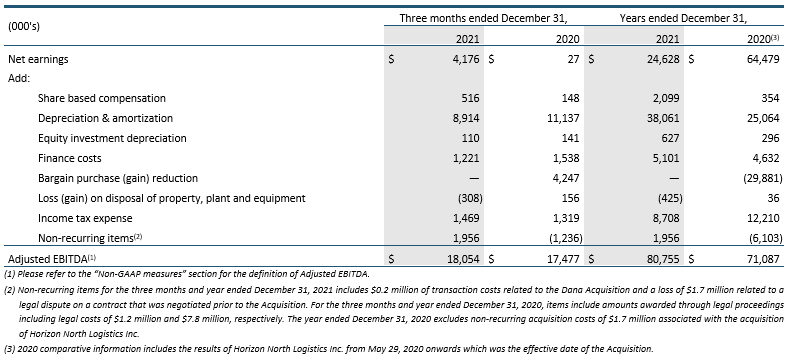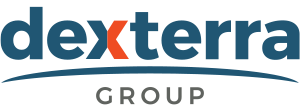Highlights
- Revenue of $201.6 million for Q4 2021 increased $37.2 million, or 23%, compared to Q4 2020. Revenue for 2021 of $733.4 million increased $255.6 million, or 53%, compared to 2020;
- Adjusted EBITDA for Q4 2021 of $18.1 million increased by $0.6 million compared to Q4 2020. Q4 2020 included $4.2 million in Canada Emergency Wage Subsidy (“CEWS”) (2021 – nil). Adjusted EBITDA for 2021 of $80.8 million increased by $9.7 million compared to 2020. 2020 included $23.8 million additional CEWS compared to 2021;
- Net earnings were $4.2 million in Q4 2021 and increased by $4.1 million compared with Q4 2020. Net earnings for 2021 were $24.6 million which was lower than 2020 due to the non-taxable $29.9 bargain purchase gain on the Acquisition as well as higher CEWS of $23.8 million in 2020, which were partially offset by stronger business results;
- Free Cash Flow for Q4 2021 was $20.8 million compared to $29.1 million in Q4 2020. This decrease related to the investment in working capital associated with growth and included CEWS of $4.2 million in 2020 results (2021 – nil). 2021 Free Cash Flow was $45.4 million compared to $64.0 million in 2020 which had higher CEWS of $23.8 million. The Corporation’s free cash flow conversion as a percentage of EBITDA exceeded 50% for the fiscal years of 2021 and 2020;
- The Corporation closed on the IFM acquisitions of Dana Hospitality LP (“Dana”) and TRICOM Facility Services Group (“Tricom”) in January 2022;
- Debt was $65.3 million at December 31, 2021, down from $85.4 million at December 31, 2020. The Corporation had available borrowing capacity of $124.5 million at December 31, 2021. These lines were used to finance the acquisitions after which leverage approximates 1.5x Adjusted EBITDA; and
- Dexterra Group declared a dividend for the first quarter of 2022 of $0.0875 per share. The dividend is payable to shareholders of record at the close of business on March 31, 2022 and will be paid on April 15, 2022.
This news release contains certain measures and ratios, such as Adjusted EBITDA, Adjusted EBITDA excluding CEWS as a % of revenue, Free Cash Flow and Backlog, that do not have any standardized meaning as prescribed by GAAP and, therefore, are considered non-GAAP measures that do not have a prescribed meaning under IFRS. The method of calculating these measures may differ from other entities and accordingly, may not be comparable to measures used by other entities. See “Non-GAAP measures” and “Reconciliation of Non-GAAP measures” at the end of this news release for further details.
Toronto, Ontario, Canada, March 9, 2022 – TSX Symbol: DXT
Fourth Quarter and Annual Financial Summary

Operations Analysis

Integrated Facilities Management (“IFM”)
For Q4 2021, IFM revenues were $39.3 million and increased by $0.7 million, or 2%, from the $38.5 million in Q4 2020. The increase is mainly attributable to the reduction of certain COVID-19 health measures and net new business. Management expects an upward trend in revenue to continue as provincial COVID-19 restrictions are lifted, especially in the aviation and retail sectors. Revenue from airports is still significantly below pre-pandemic levels, at approximately 60% in Q4 2021, despite the higher passenger travel activity levels compared to Q4 2020. We expect the return to pre-pandemic travel levels to be gradual over 2022 and into 2023. We are winning new contracts across all segments of the business and are experiencing a very competitive landscape for new work and on contract renewals. The increase in scale of operations with the Dana and Tricom acquisitions will also support revenue growth and result in cross-selling opportunities with the expanded client base as we move into a post-pandemic environment.
Adjusted EBITDA excluding CEWS as a percentage of revenue was 6% for Q4 2021, which is an improvement from 4% recorded in Q4 2020. The margins for the segment have continued to improve from Q4 2020 as COVID-19 restrictions are lifted. IFM margins continued to be impacted in Q4 2021 by overtime costs caused by staffing issues, supply chain inflation and reduced project work due to the Omicron variant.
Workforce Accommodations, Forestry and Energy Services (“WAFES”)
A significant portion of our WAFES business is support services which are not capital intensive and has similar characteristics to our Integrated Facilities Management business. Support services within Workforce Accommodations includes food and facilities services on-site at their remote locations as well as the Forestry services business which in total comprises 45% of WAFES revenue. The proportion of revenue attributable to support services is expected to grow as we focus on building this revenue base. Asset-based services represents the 55% balance of WAFES revenue including turn-key camp contracts, open lodge operations, and Energy Services where the Corporation owns the matting and relocatable structures, which are sold or rented to clients.
Revenue from the WAFES segment for Q4 2021 was $111.9 million, an increase of $33.7 million compared to Q4 2020. WAFES revenue performance was strong in Q4 2021 due to new sales, stronger camp occupancy and improved mat and relocatable structures utilization due to increased activity in the resource and energy sectors.
Adjusted EBITDA excluding CEWS as a percentage of revenue for Q4 2021 was 16%, which is higher than the Q4 2020 comparative of 15%, due to higher margin sales and higher activity levels. The Corporation also successfully negotiated improved commercial terms in Q4 2021 for services previously provided to a large client. This resulted in additional one time revenue in Q4 2021 of $1.8 million.
Revenues from Energy Services were $11.2 million for Q4 2021. Revenues for Q4 2021 were up $4.7 million from $6.5 million in Q4 2020 due to a large sale of mats of $5.3 million. Both the relocatable structures and matting business experienced higher utilization rates in the second half of 2021 given the stronger energy services environment.
Modular Solutions
Modular Solutions segment revenues for Q4 2021 were $46.5 million, a decrease of $1.7 million, or 4% as compared to Q4 2020. The segment faced temporary site and administrative delays in the rapid affordable housing projects in Ontario and site access delays on projects in British Columbia caused by flooding. Management is working closely with municipalities to predict the timing of projects and is diversifying the customer base to utilize plant capacity and optimize overhead absorption. Revenue increased by $1.4 million from Q3 2021.
Adjusted EBITDA for Q4 2021 was $2.9 million which was lower than Q4 2020. Adjusted EBITDA excluding CEWS as a percentage of revenue was 7% for the quarter which is consistent with Q4 2020.
A key metric for the Modular Solutions segment is the Backlog of projects and timing of backlog execution. The focus for this business unit is to secure and increase backlog, which was $78.6 million for rapid affordable housing at the end of 2021, excluding approximately $32 million of contracts being finalized with existing customers and backlog of $19.4 million for Industrial and U.S. manufacturing supply projects. Additionally, Modular Solutions has recurring business beyond the projects noted above for approximately $40 million per annum, consisting of education modules, retail stores and kiosks. A key goal over time is also to diversify our modular product market verticals.
Liquidity and Capital Resources
For the three months ended December 31, 2021, cash generated from operating activities was $24.6 million, compared to $34.0 million generated in the same period of 2020. The Q4 2021 results included working capital investment required to support business growth. In addition, cash flows from operating activities in Q4 2020 were positively impacted by $1.2 million in legal costs refunded and CEWS of $4.2 million.
The Corporation’s financial position and liquidity are strong. The Corporation generated Free Cash Flow of $45.4 million for the year ended December 31, 2021 and converted 56% of Adjusted EBITDA to Free Cash Flow. Debt was lower as at December 31, 2021 by $20 million as compared to December 31, 2020. Debt levels will increase with the Dana and Tricom acquisitions and the dividend payments in January 2022 and are expected to approximate 1.5x adjusted EBITDA based on the current book of business. Our strong free cash flow generation provides the ability to reduce debt, subject to future growth initiatives.
Additional Information
A copy of Dexterra Group’s Consolidated Financial Statements for the year ended December 31, 2021 and 2020 and related Management’s Discussion and Analysis (“MD&A”) have been filed with the Canadian securities regulatory authorities and are available on SEDAR at sedar.com and Dexterra Group’s website at dexterra.com. The Consolidated Financial Statements have been prepared in accordance with International Financial Reporting Standards and the reporting currency is in Canadian dollars.
Conference Call
Dexterra Group will host a conference call and webcast to begin promptly at 8:30 Eastern time on March 10, 2022 to discuss Dexterra Group’s fourth quarter results.
To access the conference call by telephone the conference call dial in number is 1-800-319-4610.
A live webcast of the conference call will be accessible on Dexterra Group’s website at dexterra.com/investor-presentations-events/ by selecting the webcast link. A PowerPoint presentation will be posted on Dexterra Group’s website at dexterra.com on March 9, 2022 to be reviewed on the conference call. An archived recording of the conference call will be available approximately one hour after the completion of the call until April 10, 2022 by dialing 1-855-669-9658, passcode 8317.
About Dexterra Group
Dexterra Group employs more than 7,500 people, delivering a range of support services for the creation, management, and operation of infrastructure across Canada. In 2021 Dexterra was named Canada’s Safest Employer in the Services Sector by Canadian Occupational Safety.
Powered by people, Dexterra Group brings best-in-class regional expertise to every challenge and delivers innovative solutions, giving clients confidence in their day-to-day operations. Activities include a comprehensive range of integrated facilities management services, industry leading workforce accommodation solutions, innovative modular building capabilities, and other support services for diverse clients in the public and private sectors.
For further information contact:
Drew Knight, CFO
Head office: Airway Centre, 5915 Airport Rd., 4th Floor Mississauga, Ontario L4V 1T1
Telephone: (416) 767-1148
You can also visit our website at dexterra.com
Non-GAAP measures
Certain measures and ratios in this news release do not have any standardized meaning as prescribed by generally accepted accounting principles (“GAAP”) and, therefore, are considered non-GAAP measures. Non-GAAP measures include “Adjusted EBITDA”, calculated as earnings before interest, taxes, depreciation, amortization, equity investment depreciation, share based compensation, bargain purchase (gain) reduction, gain/loss on disposal of property, plant and equipment and non-recurring items; “Adjusted EBITDA excluding Canada Emergency Wage Subsidy (“CEWS”) as a percentage of revenue”, calculated as Adjusted EBITDA excluding CEWS divided by revenue; “Free Cash Flow”, calculated as net cash flows from (used in) operating activities, less sustaining capital expenditures, purchase of intangible assets, lease payments and finance costs plus proceeds on the sale of property, plant and equipment; and “Backlog” which is the total value of work that has not yet been completed that: (a) has a high certainty of being performed based on the existence of an executed contract or work order specifying job scope, value and timing; or (b) has been awarded to Dexterra Group, as evidenced by an executed letter of award or agreement, describing the general job scope, value and timing of such work, and where the finalization of a formal contract in respect of such work is reasonably assured and expects to be recognized in the next 12 months. These measures and ratios provide investors with supplemental measures of Dexterra Group’s operating performance and highlight trends in its core businesses that may not otherwise be apparent when relying solely on GAAP financial measures. Dexterra Group also believes that securities analysts, investors and other interested parties frequently use non-GAAP measures in the evaluation of issuers. Dexterra Group’s management also uses non-GAAP measures in order to facilitate operating performance comparisons from period to period, to prepare annual operating budgets, and to determine components of management compensation.
These measures are regularly reviewed by the Chief Operating Decision Makers and provide investors with an alternative method for assessing the Corporation’s operating results in a manner that is focused on the performance of the Corporation’s ongoing operations and to provide a consistent basis for comparison between periods. These measures should not be construed as alternatives to net earnings and total comprehensive income or operating cash flows as determined in accordance with GAAP as indicators of the Corporation’s performance. The method of calculating these measures may differ from other entities and accordingly, may not be comparable to measures used by other entities. For a reconciliation of these non-GAAP measures to their nearest measure under GAAP please refer to “Reconciliation of non-GAAP measures”.
Reconciliation of non-GAAP measures
The following provides a reconciliation of non-GAAP measures to the nearest measure under GAAP for items presented throughout the News Release.
Adjusted EBITDA

Free Cash Flow

Adjusted EBITDA excluding CEWS

Forward-Looking Information
Certain statements contained in this news release may constitute forward-looking information under applicable securities law. Forward-looking information may relate to Dexterra Group’s future outlook and anticipated events, business, operations, financial performance, financial condition or results and, in some cases, can be identified by terminology such as “continue”; “forecast”; “may”; “will”; “project”; “could”; “should”; “expect”; “plan”; “anticipate”; “believe”; “outlook”; “target”; “intend”; “estimate”; “predict”; “might”; “potential”; “continue”; “foresee”; “ensure” or other similar expressions concerning matters that are not historical facts. In particular, statements regarding Dexterra Group’s future operating results and economic performance, including COVID-19 related impacts and the impacts of the Dana and Tricom acquisitions; its leverage, NRB Modular Solutions backlog, and its objectives and strategies are forward-looking statements. These statements are based on certain factors and assumptions, including expected growth, results of operations, performance and business prospects and opportunities regarding Dexterra Group, which Dexterra Group believes are reasonable as of the current date. While management considers these assumptions to be reasonable based on information currently available to Dexterra Group, they may prove to be incorrect. Forward-looking information is also subject to certain known and unknown risks, uncertainties and other factors that could cause Dexterra Group’s actual results, performance or achievements to be materially different from any future results, performance or achievements expressed or implied by such forward- looking information, including, but not limited to: the ability to retain clients, renew existing contracts and obtain new business; an outbreak of contagious disease that could disrupt its business; the highly competitive nature of the industries in which Dexterra Group operates; reliance on suppliers and subcontractors; cost inflation; volatility of industry conditions could impact demand for its services; a reduction in the availability of credit could reduce demand for Dexterra Group’s products and services; Dexterra Group’s significant shareholder may substantially influence its direction and operations and its interests may not align with other shareholders; its significant shareholder’s 49% ownership interest may impact the liquidity of the common shares; cash flow may not be sufficient to fund its ongoing activities at all times; loss of key personnel; the failure to receive or renew permits or security clearances; significant legal proceedings or regulatory proceedings/changes; environmental damage and liability is an operating risk in the industries in which Dexterra Group operates; climate changes could increase Dexterra Group’s operating costs and reduce demand for its services; liabilities for failure to comply with public procurement laws and regulations; any deterioration in safety performance could result in a decline in the demand for its products and services; failure to realize anticipated benefits of acquisitions and dispositions; inability to develop and maintain relationships with Indigenous communities; the seasonality of Dexterra Group’s business; inability to restore or replace critical capacity in a timely manner; reputational, competitive and financial risk related to cyber-attacks and breaches; failure to effectively identify and manage disruptive technology; economic downturns can reduce demand for Dexterra Group’s services; its insurance program may not fully cover losses. Additional risks and uncertainties are described in Note 21 of the Corporation’s Consolidated Financial Statements for the years ended December 31, 2021 and 2020 contained in its most recent Annual Report filed with securities regulatory authorities in Canada and available on SEDAR at sedar.com. The reader should not place undue importance on forward-looking information and should not rely upon this information as of any other date. Dexterra Group is under no obligation and does not undertake to update or alter this information at any time, except as may be required by applicable securities law.

